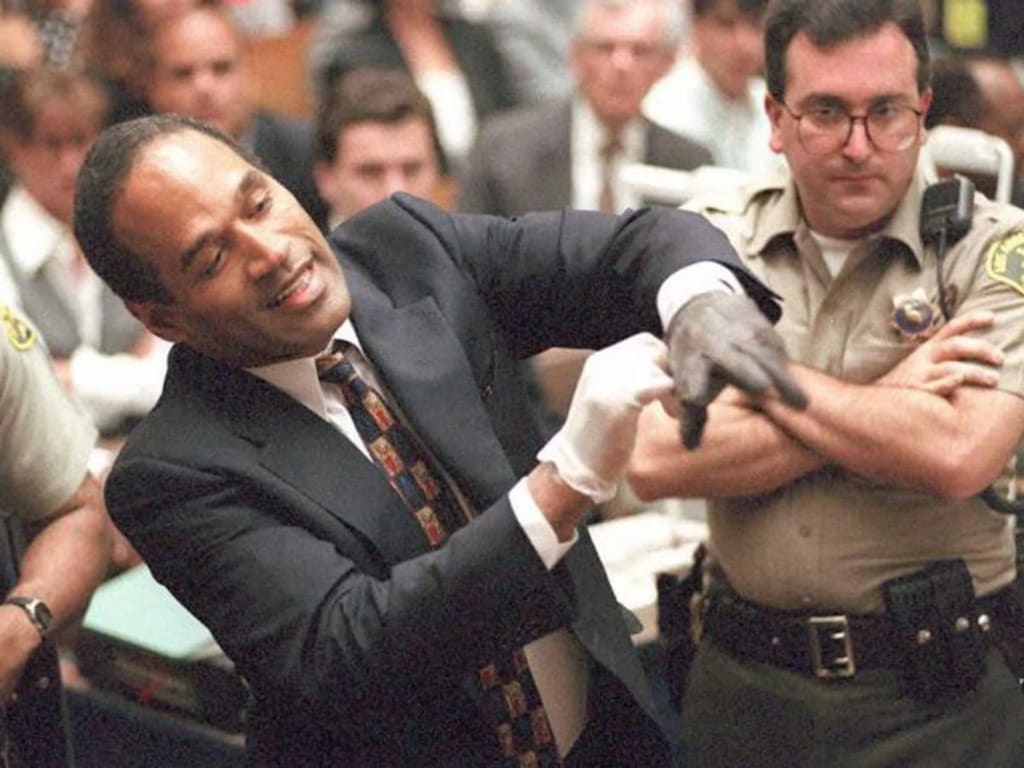The O.J. Simpson Saga: "Glove Man's" Crime
Real Crime Case of a Celebrity

Introduction:
In the mid-1990s, the United States was captivated by a crime story that would go down in history as one of the most shocking and controversial trials of all time: the case of O.J. Simpson. From his rise to football stardom to his subsequent fall from grace, this article delves into the detailed chronicle of events that led to O.J. Simpson's highly publicized murder trial, exploring the evidence, the trial itself, and the lasting impact it had on society.
The Rise and Fall of a Sports Legend:
Orenthal James Simpson, known as O.J. Simpson, rose to fame as a professional American football player. Born on July 9, 1947, in San Francisco, California, Simpson achieved great success on the football field, playing for the University of Southern California (USC) and later the Buffalo Bills in the National Football League (NFL). He became the first player in NFL history to rush for more than 2,000 yards in a single season.
The Double Homicide and the Investigation:
On June 12, 1994, the bodies of Simpson's ex-wife, Nicole Brown Simpson, and her friend, Ron Goldman, were discovered outside Nicole's Los Angeles home. Both victims had been brutally murdered, and the crime scene suggested a violent struggle had taken place. Suspicion quickly fell on O.J. Simpson as a person of interest due to his tumultuous relationship with Nicole and his history of alleged domestic violence.
The Infamous Bronco Chase:
Just days after the murder, on June 17, 1994, O.J. Simpson became the central figure in one of the most dramatic and televised car chases in history. With a warrant out for his arrest, Simpson fled in a white Ford Bronco, driven by his friend Al Cowlings. The slow-speed pursuit played out on live television, captivating millions of viewers across the country. The chase eventually ended at Simpson's Brentwood mansion, where he surrendered to the police.
The Trial of the Century:
The subsequent trial, which began on January 24, 1995, would go on to be famously dubbed the "Trial of the Century." The prosecution, led by District Attorney Marcia Clark, presented a case against Simpson that relied heavily on circumstantial and forensic evidence. The defense team, including renowned attorney Johnnie Cochran, focused on questioning the reliability and handling of the evidence, raising doubts about the investigation itself.
The Glove that Captivated the World:
One pivotal moment during the trial occurred when the prosecution presented a leather glove found at the crime scene, as well as a similar glove discovered at Simpson's residence. The prosecution asked Simpson to try on the gloves in court, but they appeared to be too small. Cochran famously uttered the phrase, "If it doesn't fit, you must acquit," implying that the evidence did not conclusively prove Simpson's guilt. The glove incident became a lasting image of the trial and had a significant impact on the jury's perception.
Race, Media, and Public Opinion:
The O.J. Simpson trial became a flashpoint for discussions on race relations and the influence of media in the United States. Simpson's defense team sought to portray him as a victim of racial bias, suggesting that the Los Angeles Police Department had mishandled evidence and targeted him due to his race. The trial received extensive media coverage, with TV networks broadcasting every twist and turn of the proceedings, further dividing public opinion along racial lines.
The Verdict and Its Aftermath:
On October 3, 1995, after months of trial and deliberation, the jury reached a verdict. In a shocking decision, O.J. Simpson was acquitted of all charges of murder. The verdict sparked widespread reactions, ranging from celebration among Simpson's supporters to disbelief and outrage among those who believed in his guilt. The trial had become a symbol of the deep racial and social divisions in the United States.
The Legacy of the Trial:
The O.J. Simpson case left an indelible mark on American society and the criminal justice system. It revealed deep-seated racial tensions and raised questions about the fairness and reliability of the legal process. The trial also had a significant impact on media coverage of high-profile cases, marking a turning point in the sensationalism and commercialization of news. The case continues to be a subject of fascination and study, reminding us of the complexities and challenges inherent in the pursuit of justice.
Conclusion:
The O.J. Simpson murder trial remains one of the most infamous and controversial legal sagas in American history. From the shocking double homicide to the gripping trial and its aftermath, the case captivated the nation, exposing deep societal divisions and raising critical questions about race, media, and the criminal justice system. While the verdict may have ended the trial, the legacy of the O.J. Simpson saga continues to reverberate through the annals of American culture and criminal law.
About the Creator
Zakria Mirza
My multifaceted abilities as a writer and leader shine brilliantly. With a dazzling literary prowess that captivates and mesmerizes, my words possess an exquisite eloquence, leaving readers spellbound.






Comments
There are no comments for this story
Be the first to respond and start the conversation.